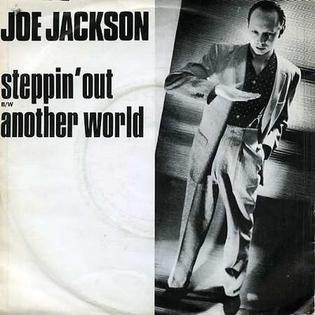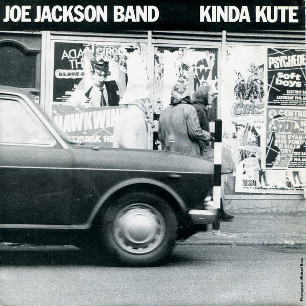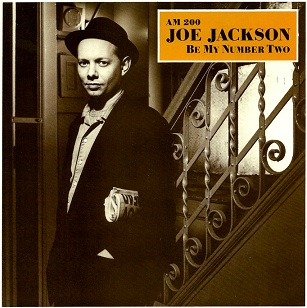
David Ian "Joe" Jackson is an English musician, singer and songwriter. Having spent years studying music and playing clubs, he scored a hit with his first release, "Is She Really Going Out with Him?", in 1979. It was followed by a number of new wave singles, before he moved to more jazz-inflected pop music and had a top 10 hit in 1982 with "Steppin' Out". Jackson is associated with the 1980s Second British Invasion of the US. He has also composed classical music. He has recorded 20 studio albums and received five Grammy Award nominations.

Night and Day is the fifth studio album by English musician Joe Jackson, released on 25 June 1982 by A&M Records. It reached the top five in both the United Kingdom and United States, Jackson's only studio album to do so in either country. The album has been certified gold in the UK and US, and achieved platinum status in Canada. It has sold over one million copies.

"Hungry Like the Wolf" is a song by English new wave band Duran Duran. Written by the band members, the song was produced by Colin Thurston for the group's second studio album, Rio (1982). The song was released on 4 May 1982 as the band's fifth single in the United Kingdom, and 8 June 1982 in the United States. It reached No. 5 on the UK Singles Chart, and received a platinum certification from the British Phonographic Industry (BPI).

Body and Soul is the seventh studio album by English singer-songwriter Joe Jackson, released on 14 March 1984 by A&M Records. Jackson's first fully digital project, it peaked at No. 14 in the UK, while in the US it reached No. 20. Described by one reviewer as a sophisti-pop album, the tracks are a mix of pop, jazz and Latin music, showcasing the hit single "You Can't Get What You Want ". Two other singles fared well, with "Happy Ending" charting in five countries, and "Be My Number Two" enjoying moderate success in the UK.

"Is She Really Going Out with Him?" is a song written and performed by British musician Joe Jackson. It was released in October 1978 as his debut single and was later included on Jackson's debut album, Look Sharp! The track was one of the first Jackson recorded with his new backing band, a band he would perform with for his first three albums. Written as a humorous commentary on women dating unattractive men, the song contains a prominent bass line and a chorus praised by critics as memorable. Jackson has since stated that the song's reputation for being angry was untrue.

Live 1980/86 is a Joe Jackson double live album, released in May 1988. It was recorded during the 1980 Beat Crazy tour, the 1982-83 Night and Day tour, the 1984 Body & Soul tour, and the 1986 Big World tour. Notably, the album contains three different versions of "Is She Really Going Out with Him?"

"Steppin' Out" is a song by English musician Joe Jackson, originally included on his 1982 album Night and Day. The song, inspired by Jackson's time in New York City, was his highest-charting single in America, where it peaked at number 6 on the Billboard Hot 100. It reached the same position in Jackson's native UK.
David Kershenbaum is an American record producer and entrepreneur, born in Springfield, Missouri. He has worked with many artists including Duran Duran, Tracy Chapman, Joe Jackson, Laura Branigan, Bryan Adams, Supertramp, Cat Stevens, Elkie Brooks, and Tori Amos. As a producer he has earned 75 international gold and platinum albums. His work has yielded multiple Grammys and an Oscar nomination.

"Blue World" is a 1983 single by the Moody Blues written by Justin Hayward. It was first released in the UK as the lead single of the album The Present in August 1983. It was released as single in the US in the Fall of 1983. "Blue World" was one of three singles from The Present, with the others being "Sitting at the Wheel" and "Running Water." The single's cover is a pastiche of the painting Daybreak by Maxfield Parrish.

"Kinda Kute" is a song by British singer-songwriter and musician Joe Jackson, which was released in 1980 as the third and final single from his second studio album I'm the Man (1979). Described as a "pop song" by Jackson, the song was written by Jackson and produced by David Kershenbaum. "Kinda Kute" failed to chart in the UK, but reached number 91 on Canada's RPM Top Singles chart.

"Real Men" is a song by English singer-songwriter and musician Joe Jackson, released in 1982 as the lead single from his fifth studio album, Night and Day. The song was written by Jackson, and was produced by Jackson and David Kershenbaum. Although "Real Men" only reached number 89 in the UK Singles Chart, it became a hit in the Dutch language area, as well as Australia where it peaked at number 6. The song was covered by Tori Amos on her 2001 album of gender-swapped covers, Strange Little Girls.

"Happy Ending" is a song by British singer-songwriter and musician Joe Jackson, which was recorded as a duet with Elaine Caswell and released in April 1984 as the second single from Jackson's sixth studio album Body and Soul. The song was written by Jackson, and produced by Jackson and David Kershenbaum. "Happy Ending" reached No. 58 in the UK Singles Chart and No. 57 on the US Billboard Hot 100.

"Be My Number Two" is a song by British singer-songwriter and musician Joe Jackson, which was released in 1984 as the third and final single from his sixth studio album Body and Soul. It was written by Jackson, and produced by Jackson and David Kershenbaum. "Be My Number Two" reached No. 70 in the UK and remained in the charts for four weeks.

"Right and Wrong" is a song by British singer-songwriter and musician Joe Jackson, which was released in 1986 as the lead single from his live album Big World. It was written by Jackson, and produced by David Kershenbaum and Jackson. "Right and Wrong" peaked at No. 90 on the UK Singles Chart, and No. 11 on the US Billboard Album Rock Tracks chart.

"Nineteen Forever" is a song by British singer-songwriter and musician Joe Jackson, which was released in 1989 as the lead single from his eighth studio album Blaze of Glory. It was written and produced by Jackson. "Nineteen Forever" reached No. 4 on the US Billboard Modern Rock Tracks and No. 16 on Billboard Album Rock Tracks charts.

"Since You're Gone" is a song by the American rock band the Cars. It was released as the second single from their fourth album, Shake It Up.

"Dancing the Night Away" is the debut single by English rock band the Motors, which was released in 1977 as the lead single from their debut studio album 1. The song was written by band members Andy McMaster and Nick Garvey, and produced by Robert John "Mutt" Lange.

"Home Town" is a song by the British new wave musician Joe Jackson released on Jackson's 1986 live album, Big World. Written as an ode to his home of Portsmouth, "Home Town" was later released as the follow-up to his politically-charged single, "Right and Wrong". Despite its lack of chart success, the song has since attracted positive critical reception.

"Down to London" is a song by British singer-songwriter and musician Joe Jackson, released in 1989 as the second single from his eighth studio album Blaze of Glory. The song was written and produced by Jackson.

"Memphis" is a song by English singer-songwriter and musician Joe Jackson, which was released in 1983 as a single from the soundtrack album of the American film Mike's Murder. The song was written by Jackson, and produced by Jackson and David Kershenbaum. "Memphis" reached No. 85 on the US Billboard Hot 100.



















